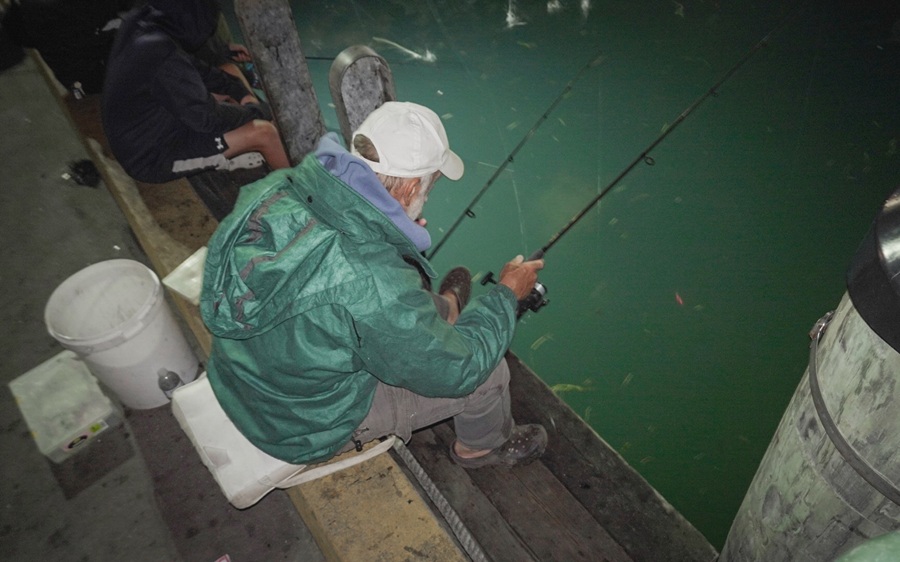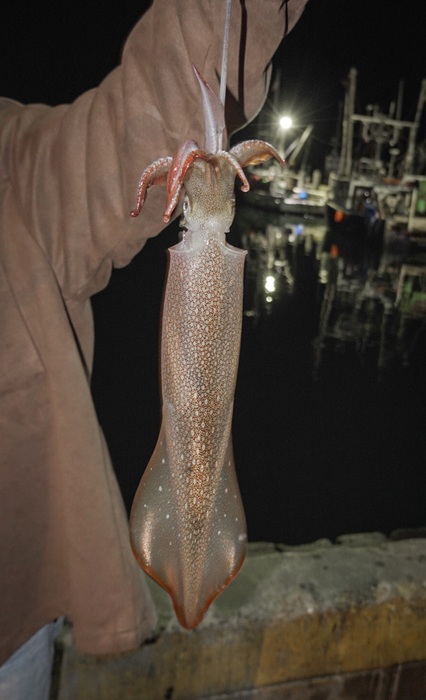It’s dark, well past 10:30 p.m., when I walk out the wharf, but I’m not the only one on Provincetown’s MacMillan Pier at this hour. Fluorescent boat lights shine on the still water. An engine ignites. Two guys stroll by with carts.
“Were you squidding?” I ask. “Yep, 20 pounds,” one of them answers.
And here come two more with their carts and rods. Maybe I got here too late. But the sign on the harbormaster’s shack reads, “All fishing ends promptly at 11:30 p.m.” It also says, “You must have a bucket to fish. Do not clean squid on the pier or in restrooms.”
“I work nights,” says Freddie DeSousa, a retired Provincetown police officer who now works as a night watchman on the pier. He’s rolling around in his chair in the harbormaster’s shack. DeSousa likes the quiet of the night shift: “I can have my dinner in peace.” The only hard thing about it would be if the midnight guy doesn’t show up. In that case, he says, he could be here till 6 a.m.

DeSousa looks out the shack windows. A row of fishing rods hangs off the east side of the pier. The squidders — more than 30 of them — huddle together in pairs and trios along the dock’s edge. “They’re squidding,” DeSousa confirms. “But at midnight it ceases.”
The harbor lights attract baitfish to the pier and the squid follow. These cephalopods, the ones usually caught at MacMillan Pier, are the longfin species, Doryteuthis pealii, commonly known as Loligo squid. They appear in big numbers in spring, are pursued in summer by seasonal predators — bass and bluefish among them — and move offshore in fall.
Right now, the tide is high, and the water’s about 25 feet deep. Out at the pier’s edge, Anthony Bartolini casts his line. He lives in Eastham. Some nights, he says, he goes home with a half bucket of squid, though “tonight’s not one of those nights.” They’re good to eat, and they’re good for bait, he tells me.
“I was weaned on squid, being Italian,” he says. “My mother used to make it all the time. She’d just make it in a nice big pile with her homemade spaghetti sauce.”
To squid, all you need is a fishing pole, a bucket, and a basic squid jig — that’s the lure, with barbless hooks, which the squid get their tentacles wrapped around. “If they all got in a frenzy, you could fill a half bucket,” says Bartolini.

Squidding isn’t necessarily better at night. “Everyone has their theories,” Bartolini says, “but the daytime gets big schools, too.” He dips his jig into the water. There are, he says, “no tricks — it’s all luck. I got a mess here. Don’t judge me on it.”
He says squid fishing off the pier is better than being on a boat. Neater. In a boat, you’re more likely to get sprayed with ink as you reel a squid in at a different angle, he says.
“You could dye clothes with it if you wanted to,” he says about the ink as he catches a squid and hoists it onto the pier.
Bartolini got here on the later side tonight. At one point, years ago, he says, they closed the area down because it became a party spot at night. He peers down into the water and says quietly to his friend Joe, “there’s a load of ’em down to your left.”
The squid move fast, darting through the water. “When they scoot, they scoot,” Bartolini says. He catches another and slaps its wet back on the side of the pier. A round eye stares up into the dark.
“Some of the big guys are showing up now,” says Joe. The harbor lights turn the water a dusty emerald.
The water now teems with squid. “A whole school just came in,” says Kame Tong, who drives up once a week from East Taunton. “A little ride,” he says, dipping his orange fishing rod in the water. Tong has been coming to the pier to squid for 10 years. “Just me, my wife, and my dad,” he says.
Tong cooks the squid up for himself or gives them to friends. He comes here for fun. “Good little hobby,” he says.
He fishes in Hingham for bigger gamefish but comes to this spot in Provincetown for squid. He likes the simplicity of the fishing: “You don’t need heavy duty stuff.”

There’s a squid on his line. He hoists it up. The squid splashes and squirts, twirling its mantle mid-air in the harbor lights and finally landing in Tong’s bucket. Squid ink sprays all over us. An older gentleman takes a cloth and wipes down my arm. “They get scared,” Tong says, with the squid puffing in the bucket next to him.
Now, there is a rush of squid in the water below. “You have to be quick,” says Tong. “Fishing takes time, but squidding is drop down and pick up.” The squid move using jet propulsion, expelling water through an interior siphon.
Squid bite. Or at least a squid has a sharp beak inside its mouth for dismembering prey. Though it would be rare for one to bite a human, Tong says, “Sometimes they latch onto you.”
DeSousa comes out and says he’s going to close the bathroom for the night. It’s a kind of last call.
Farther down the pier, past the second-to-last dock, another group of squid jiggers quietly cast their lines. They’ve brought a lantern and hooked it to the pier. Its light shines down into the water. Steve Hoffman, up from Vernon, Conn., sits in the center of the bunch in a dark teal jacket. He’s camping in Provincetown for a week with family and friends.
He likes to bring his grandkids to the pier for squidding, and he’s taught them to clean their catch and take care with the tentacles — the tenderest part, he says.
“Grandpa, we got one!” says a kid, who stops by to present Hoffman with a yellow-toned squid. Hoffman’s not having the best luck himself. “They’re a little finicky tonight,” he says.
People start to pack up slowly — they’re in no rush. The midnight shift guy arrives at the harbormaster’s shack a few minutes before the hour. DeSousa comes out on the deck. “About that time, you know.”



